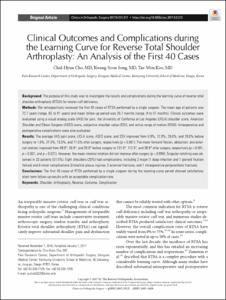KUMEL Repository
1. Journal Papers (연구논문)
1. School of Medicine (의과대학)
Dept. of Orthopedic Surgery (정형외과학)
Clinical Outcomes and Complications during the Learning Curve for Reverse Total Shoulder Arthroplasty: An Analysis of the First 40 Cases
- Alternative Author(s)
- Cho, Chul Hyun; Song, Kwang Soon
- Journal Title
- Clinics in Orthopedic Surgery
- ISSN
- 2005-291X
- Issued Date
- 2017
- Keyword
- Shoulder; Arthroplasty; Reverse; Outcome; Complication
- Abstract
- Background: The purpose of this study was to investigate the results and complications during the learning curve of reverse total
shoulder arthroplasty (RTSA) for rotator cuff deficiency.
Methods: We retrospectively reviewed the first 40 cases of RTSA performed by a single surgeon. The mean age of patients was
72.7 years (range, 63 to 81 years) and mean follow-up period was 26.7 months (range, 9 to 57 months). Clinical outcomes were
evaluated using a visual analog scale (VAS) for pain, the University of California at Los Angeles (UCLA) shoulder score, American
Shoulder and Elbow Surgeon (ASES) score, subjective shoulder value (SSV), and active range of motion (ROM). Intraoperative and
postoperative complications were also evaluated.
Results: The average VAS pain score, UCLA score, ASES score, and SSV improved from 6.9%, 12.8%, 29.0%, and 29.0% before
surgery to 1.6%, 27.0%, 73.3%, and 71.5% after surgery, respectively (p < 0.001). The mean forward flexion, abduction, and external
rotation improved from 68.0°, 56.9°, and 28.0° before surgery to 131.0°, 112.3°, and 38.8° after surgery, respectively (p < 0.001,
p < 0.001, and p = 0.021). However, the mean internal rotation did not improve after surgery (p = 0.889). Scapular notching was observed
in 33 patients (51.5%). Eight shoulders (20%) had complications, including 2 major (1 deep infection and 1 glenoid fixation
failure) and 6 minor complications (3 brachial plexus injuries, 2 acromial fractures, and 1 intraoperative periprosthetic fracture).
Conclusions: The first 40 cases of RTSA performed by a single surgeon during the learning curve period showed satisfactory
short-term follow-up results with an acceptable complication rate.
- Department
- Dept. of Orthopedic Surgery (정형외과학)
- Publisher
- School of Medicine
- Citation
- Chul-Hyun Cho et al. (2017). Clinical Outcomes and Complications during the Learning Curve for Reverse Total Shoulder Arthroplasty: An Analysis of the First 40 Cases. Clinics in Orthopedic Surgery, 9(2), 213–217. doi: 10.4055/cios.2017.9.2.213
- Type
- Article
- ISSN
- 2005-291X
- Appears in Collections:
- 1. School of Medicine (의과대학) > Dept. of Orthopedic Surgery (정형외과학)
- 파일 목록
-
-
Download
 oak-2017-0091.pdf
기타 데이터 / 108.6 kB / Adobe PDF
oak-2017-0091.pdf
기타 데이터 / 108.6 kB / Adobe PDF
-
Items in Repository are protected by copyright, with all rights reserved, unless otherwise indicated.